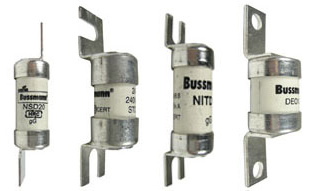In electronics and electrical engineering, a fuse is a type of low resistance resistor that acts as a sacrificial device to provide overcurrent protection, of either the load or source circuit. Its essential component is a metal wire or strip that melts when too much current flows, which interrupts the circuit in which it is connected. Short circuit, overloading, mismatched loads, or device failure are the prime reasons for excessive current.

A fuse interrupts excessive current so that further damage by overheating or fire is prevented. Wiring regulations often define a maximum fuse current rating for particular circuits. Overcurrent protection devices are essential in electrical systems to limit property damage and threats to human life. Fuses are selected to allow passage of normal current plus a marginal percentage and to allow excessive current only for short periods. Slow blow fuses are designed to allow harmless short-term higher currents but still clear on a sustained overload.
Fuses are manufactured in a wide range of current and voltage ratings and are widely used to protect wiring systems and electrical equipment. Self-resetting fuses automatically restore the circuit after the overload has cleared; these are useful, for example, in aerospace or nuclear applications where fuse replacement is impossible.